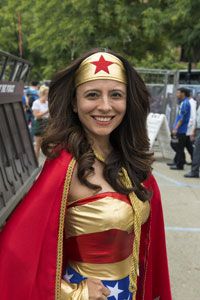Health
Comic-Con: A Healthy Dose of Non-Reality
Why Comic-Con is good for your mental health.
Posted July 25, 2014

The subject was Comic-Con, and the couple in front of me at Starbucks was trying to puzzle it out.
“It’s crazy,” one said. “All those people walking around like they’re at a kids’ Halloween party. What’s the attraction?”
If they had asked me, I’d have answered that question. I also would have made the case that this annual celebration of all that is imaginary is not only not crazy, it’s good for your mental health.
No, I’m not a closet Trekkie. I’ve always preferred my science without the fiction. But I am a psychiatrist who has spent his career studying addictions, obsessions and behavior, and I know that retreating into fantasy can sometimes help us forge better realities.
There are limits, of course. If you own more superhero capes than shirts, for example, you may be among the minority who has a problem.
For most, however, going to Comic-Con is the equivalent of a mental vacation. The real world is left behind for the more than 100,000 who pile into the San Diego Convention Center each year (and, in recent years, overflow to surrounding venues), many of them dressed to impress as their favorite superhero or villain. It’s a far cry from the event’s humble beginnings in 1970, when 300 people squeezed into the basement of San Diego’s U.S. Grant Hotel to talk comics.
Over the years, Comic-Con has morphed into more of an entertainment showcase, mainly because Hollywood has been unable to resist the temptation to parade its offerings in front of such an enormous and enthusiastic crowd. But at its heart, Comic-Con remains a place where those united in a love of all things geeky can get a dose of non-reality.
Here’s why I think that’s healthy:
It’s a way to try on new identities. Dressing up as Princess Leia or The Hulk may strike some as silly, but role-playing is a time-honored way to transcend our limits. All of us feel tied at times by our personas, stuck in who we are and how we experience the world. Donning a costume and becoming someone else lets us see ourselves with fresh eyes. We can try on new identities and determine what might be possible. For example, if you are confident and assured as Superman, you might find yourself believing it is possible to be those things when the costume comes off.
It frees the imagination. Comic-Con is all about imagination - imagining other worlds, other powers, other times, other abilities. When we allow ourselves to enter that fantasy mindset, we no longer have to view the world from a single frame of reference with its limited set of options. Simply imagining goals has been shown to help us achieve them. Just think what goals you might reach if you imagine things from the point of view of someone for whom ordinary rules don’t apply.
It creates a group. Humans aren’t the fastest animals or the strongest or the most adaptable. Our survival has always depended on being part of a shared group. One of the difficulties in today’s society is that these groups are much larger and more anonymous than ever. It can be difficult to find that club-like feeling we crave and instinctively find so familiar and comforting. Comic-Con lets its participants be part of a club whose members share the same ideas about what is fun. There’s something powerfully validating in that. Those in the group come away feeling a little more accepted and a little more connected.
It’s play, and play is good for us. Animals play, children play. Why not adults? Comic-Con gives a green light to the desire to be goofy that we all have but that we are usually too inhibited, busy or guilty to indulge. Play - and I’m talking about the experience of being playful, not competitive play - has the power to lower stress and anxiety, and to improve creativity, problem-solving and relationships across all age groups, to name just a few of its benefits. Oh, and it’s fun.
Embracing the Fantastic
So, for the couple in the Starbucks line, there’s my explanation. In short, it may look a little silly from the outside, but there’s something to be said for allowing a little fantasy into our lives. And for those lucky enough to have scored tickets to Comic-Con (no small feat), my message is this: You’re going to get much more from the experience than that selfie with Wil Wheaton. So dust off those Spock ears and enjoy.
Dr. David Sack is board certified in psychiatry, addiction psychiatry and addiction medicine. As CEO of Elements Behavioral Health, he oversees mental health treatment programs at Lucida Treatment Center in Florida, Malibu Vista in California and rehab centers in Utah, California, Florida, and Texas.




